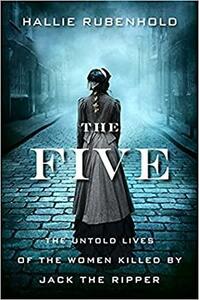Take a photo of a barcode or cover
informative
medium-paced
emotional
informative
challenging
dark
emotional
sad
medium-paced
Wow. I don’t read a lot of non-fiction, I picked this up for a goodreads reading challenge and am so glad I did! I truly think everyone needs to read this book. This was very eye opening and goes to show how society tends to remember the killer and disregard the victims. The research the author did for this book is insanely impressive. My heart broke for each of these women.
I just can’t get into the mood for this right now
informative
sad
slow-paced
slow-paced
I've been fascinated by this case for years, but this book did little for me. I don't know if it was the way it was written or how the narrator presented it, but it was very boring, felt preachy, and it felt fluffed out with information that didn't need to be there. I kept imagining an old woman standing in a college classroom, droning on in a monotone voice while stopping every few minutes to say, "this was really bad, wasn't it? this was terrible, can you believe this happened?"
Like, we all know it was terrible. We all know it was bad and that women were treated poorly back then. Then there's the note at the end about how things haven't really changed, that Jack still exists today but as a different person. I feel bad for what happened to them women and I can't say whether they were prostitutes or not, there's no proof in either direction. However, to talk about these horrible murders and then mention modern day misogyny like it's the same thing?
I'm tired of feminists. They've seriously lost the plot. I don't like to be preached at when I'm learning history.
Like, we all know it was terrible. We all know it was bad and that women were treated poorly back then. Then there's the note at the end about how things haven't really changed, that Jack still exists today but as a different person. I feel bad for what happened to them women and I can't say whether they were prostitutes or not, there's no proof in either direction. However, to talk about these horrible murders and then mention modern day misogyny like it's the same thing?
I'm tired of feminists. They've seriously lost the plot. I don't like to be preached at when I'm learning history.
This book details the lives of Jack the Ripper's victims and aims to change the narrative of 'they were just prostitutes'. Extensively researched and gives a perspective on life in poor Victorian London (lots of discussions on workhouses, child mortality & alcoholism).
challenging
dark
emotional
informative
reflective
sad
medium-paced
dark
emotional
informative
reflective
tense
medium-paced
The Five by Hallie Rubenhold is a powerful, meticulously researched work of nonfiction that breathes life back into the stories of Polly Nichols, Annie Chapman, Elizabeth Stride, Catherine Eddowes, and Mary Jane Kelly, the five women whose names are so often overshadowed by the man who murdered them. Instead of focusing on the infamous figure of Jack the Ripper, Rubenhold shifts the spotlight to his victims, giving them the dignity and attention they have long been denied.
Each chapter offers an intricate, emotionally resonant portrait of one woman’s life, complete with rich historical context, family dynamics, and the social pressures and hardships they faced in Victorian England. Rubenhold peels back the assumptions long held by both police and the public, particularly the label of “prostitute” that was unfairly applied to all five. In fact, her careful documentation and use of personal records show that only two of the women actually identified as sex workers. The others were victims of poverty, addiction, and a harsh, unforgiving society that failed them.
Rubenhold’s narrative voice is both compassionate and compelling, grounded in historical fact but alive with empathy. Her work restores humanity to women who have too often been reduced to footnotes in true crime lore. The Five doesn’t just reclaim their stories, it challenges readers to reconsider how society remembers victims and whose lives are deemed worthy of remembrance.
Each chapter offers an intricate, emotionally resonant portrait of one woman’s life, complete with rich historical context, family dynamics, and the social pressures and hardships they faced in Victorian England. Rubenhold peels back the assumptions long held by both police and the public, particularly the label of “prostitute” that was unfairly applied to all five. In fact, her careful documentation and use of personal records show that only two of the women actually identified as sex workers. The others were victims of poverty, addiction, and a harsh, unforgiving society that failed them.
Rubenhold’s narrative voice is both compassionate and compelling, grounded in historical fact but alive with empathy. Her work restores humanity to women who have too often been reduced to footnotes in true crime lore. The Five doesn’t just reclaim their stories, it challenges readers to reconsider how society remembers victims and whose lives are deemed worthy of remembrance.




